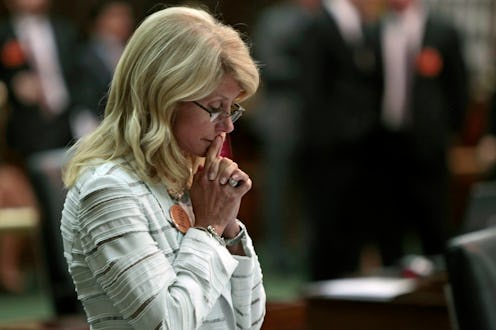News
Wendy Davis Loses Texas Gubernatorial Race
Democrat and reproductive rights icon Wendy Davis has lost the gubernatorial race against Republican Greg Abbott. While the news is sad for many of her fans (aka those of us who don't want our uteruses legislated by men) it's also not a shocker. On Monday, journalist Nate Silver released his famously accurate forecasts for the 2014 gubernatorial elections on his FiveThirtyEight blog, and predicted that Davis' chances of beating her Republican opponent Greg Abbott were less than one percent. Those were, needless to say, very bad odds.
Indeed, Davis lost by a wide margin Tuesday night, and had been trailing in the polls in excess of the margin of error, losing by double digits for over a month. So, what went wrong? Well, for one thing, Davis' battle was always going to be an uphill one. As Bustle reported way back when Davis announced her candidacy,
Conventional wisdom in the Lonestar State is that, barring a complete collapse or meltdown of the Abbott campaign, Davis will be an inspiring but ultimately unsuccessful candidate. The state hasn’t elected a Democrat to the governorship in over 20 years, Davis has never run a statewide campaign before, and Abbott is generally well-regarded in the state.
Davis also mad a series of missteps in her campaign, from going after Abbott's wife on Twitter, to an ill-conceived wheelchair ad vilifying her "paralyzed" opponent, which was exactly as bad as you'd imagine.
A tree fell on Greg Abbott. He sued and got millions. Since then, he’s spent his career working against other victims. Abbott argued a woman whose leg was amputated was not disabled because she had an artificial limb. He ruled against a rape victim who sued a corporation for failing to do a background check on a sexual predator. He sided with a hospital who failed to stop a dangerous surgeon who paralyzed patients. Greg Abbott — he’s not for you.
The point was there — as was Davis' continued desire to stand up for the rights of women. Where it appears Davis went wrong was in assuming that desire would rise above any political mudslinging.
